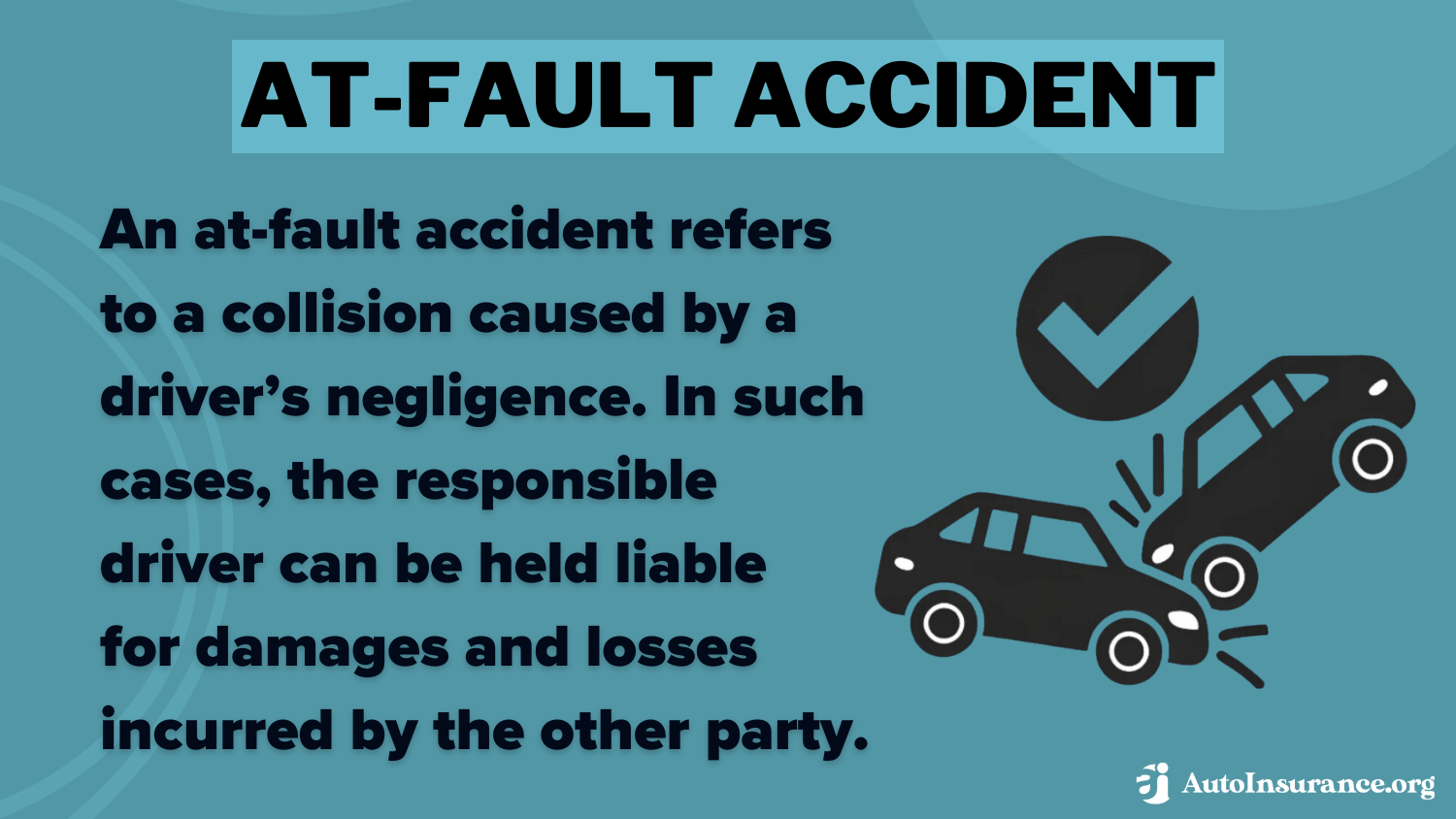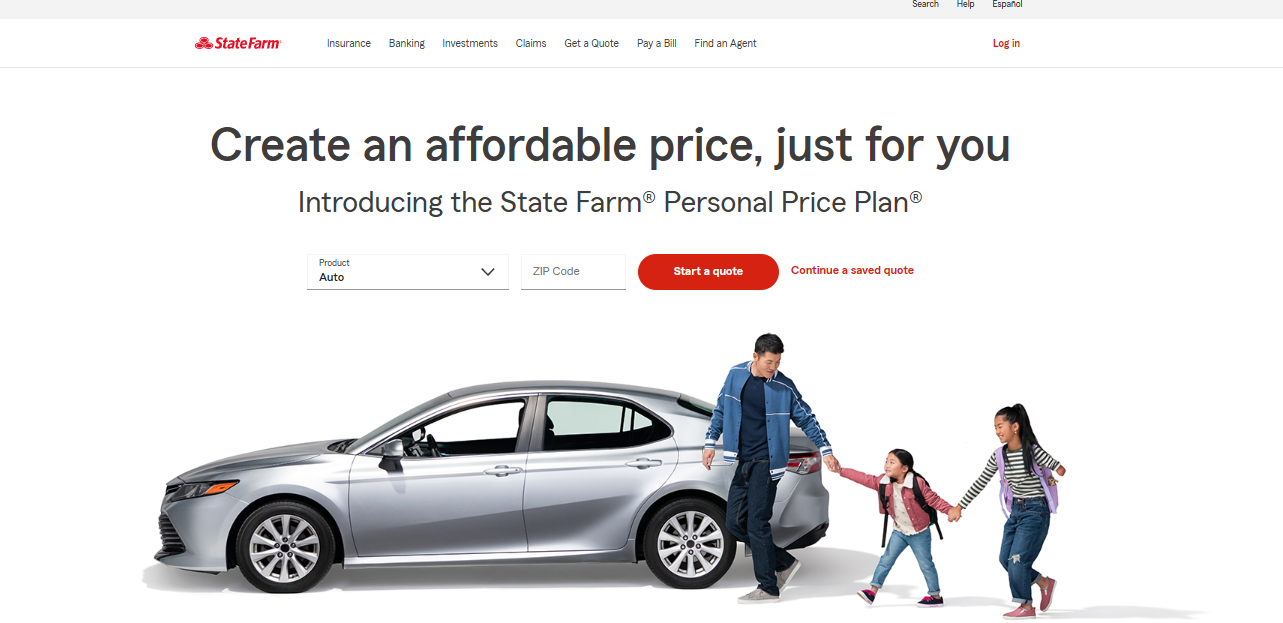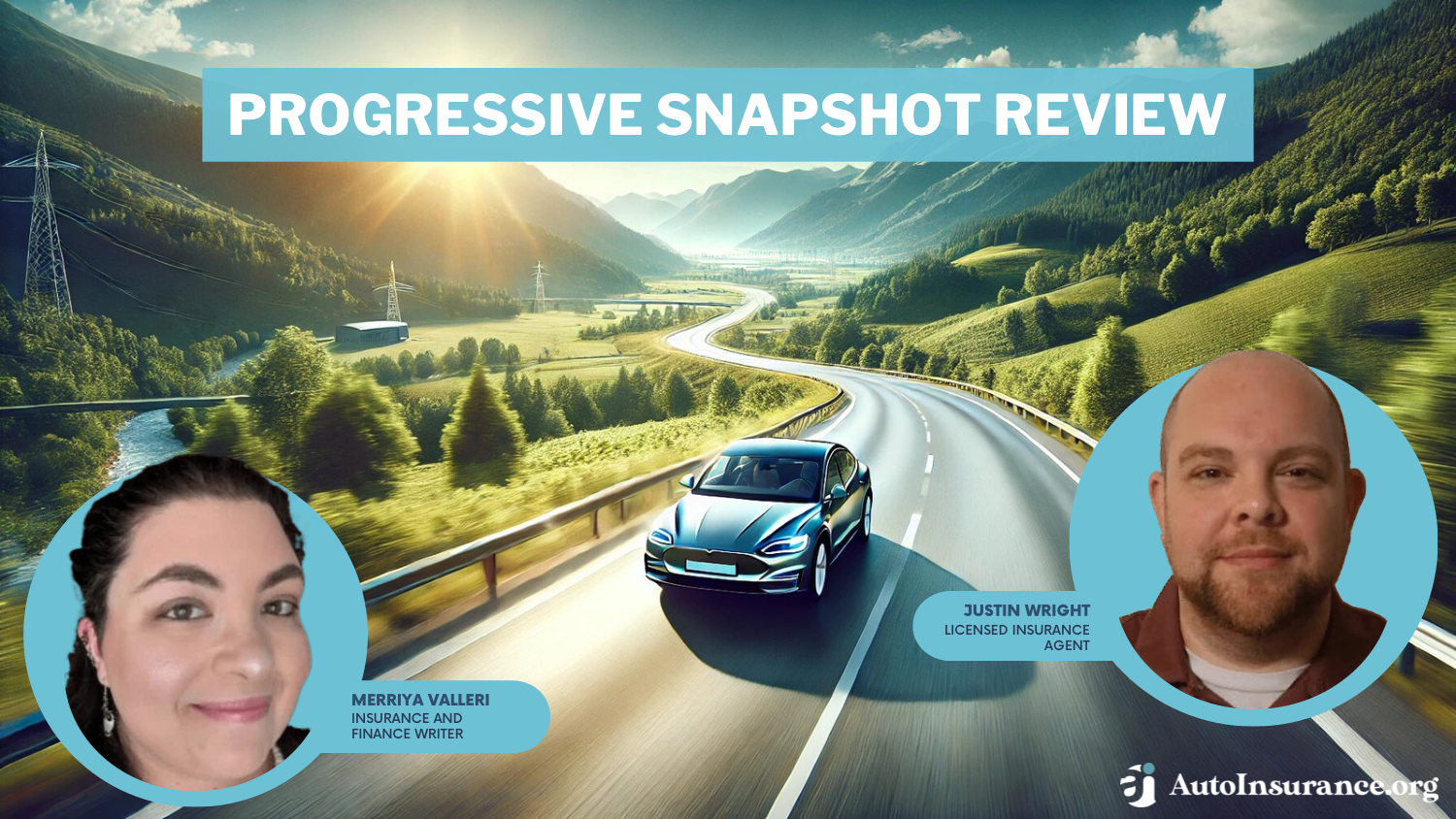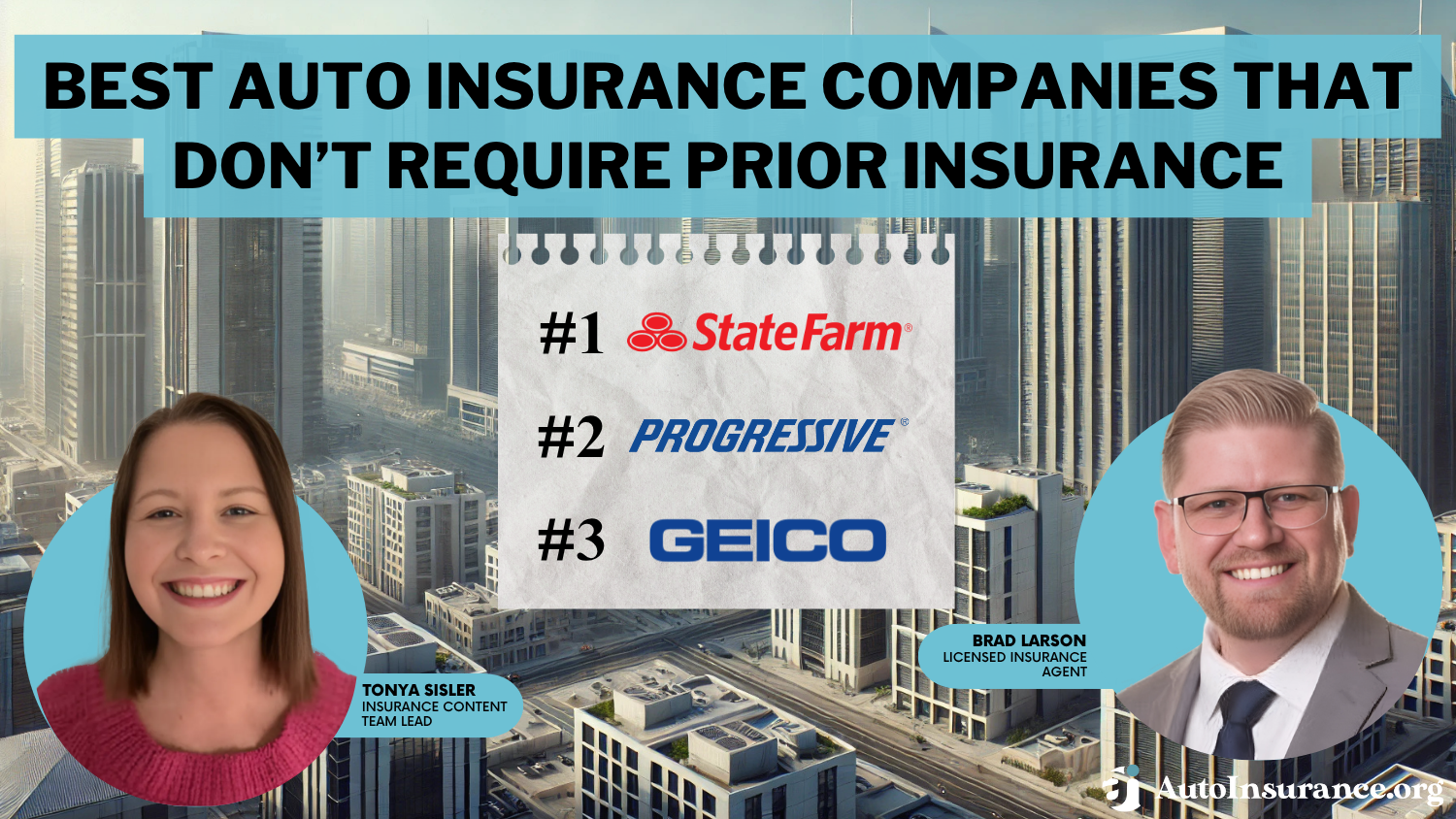Auto Insurance Premium in 2026 (In-Depth Explanation)
Auto insurance premiums are the monthly or semi-annual payments drivers make for coverage, with rates starting as low as $32 per month. This guide breaks down how insurance premiums are calculated, what factors influence them, and practical tips to reduce your insurance costs.
Read more Secured with SHA-256 Encryption




Table of Contents
Table of Contents


Former State Farm Insurance Agent
Benjamin Carr worked as a licensed insurance agent at State Farm and Tennant Special Risk. He sold various lines of coverage and informed his clients about their life, health, property/casualty insurance needs. Assessing risks and helping people find the best coverage to suit their needs is a passion of his. He appreciates that insurance was designed to protect people, particularly during times...
Benjamin Carr


Licensed Insurance Agent
Heidi works with top-rated insurance carriers to bring her clients the highest quality protection at the most competitive prices. She founded NoPhysicalTermLife.com, specializing in life insurance that doesn’t require a medical exam. Heidi is a regular contributor to several insurance websites, including FinanceBuzz.com, Insurist.com, and Forbes. As a parent herself, she understands the need ...
Heidi Mertlich
Updated August 2025
An auto insurance premium refers to the recurring amount you pay, either on a monthly or semi-annual basis, to maintain your insurance coverage and protect your vehicle.
At the best auto insurance companies, several factors affect your insurance premium, from the car you drive to your coverage options. You may also qualify for an insurance premium grace period if you need to make a late payment.
Our guide explains what insurance premiums are, how they’re calculated, average costs, and the difference between premiums and deductibles. Start lowering premiums by entering your ZIP code in our free quote tool.
- Car insurance premiums can be paid monthly or in full every six months to a year
- Insurance companies look at multiple driver factors to calculate premiums
- Insurance premiums will increase if drivers get in accidents or receive traffic tickets
Auto Insurance Premium Defined
A car insurance premium is a monthly or semi-annual payment you make for coverage. It’s important to understand that insurers use several factors to calculate each driver’s risk.
Auto Insurance Premium Cost by Provider
| Insurance Company | Monthly Rates |
|---|---|
| $87 | |
| $76 | |
| $43 | |
 | $96 |
| $42 | |
 | $63 |
| $56 | |
| $47 | |
| $53 | |
| $32 |
- Auto Insurance Premiums
- How Vehicle Year Affects Auto Insurance Rates in 2026
- How long does an accident stay on your record? (2026)
- Non-Driving Factors That Affect Auto Insurance Rates (2026)
- Does a physical control violation affect auto insurance rates?
- Cheapest Auto Insurance for Teen Drivers in Texas (10 Most Affordable Companies in 2026)
- How Annual Mileage Affects Your Auto Insurance Rates: What You Should Know (2026)
- Does a suspended license affect auto insurance rates?
- Do I have to declare speeding points on my insurance?
- Does the price of a car affect auto insurance rates?
- Does damage to a parked car cause insurance rate increases?
- Why did my auto insurance rates increase when I moved? (2026)
- How long does a speeding ticket affect your auto insurance rates? (2026)
- How Accident Surcharges Affect Auto Insurance Rates in 2026
The higher your risk of filing a claim, the higher the insurance company will set your premium. The main factors insurance companies use to calculate premiums include:
- Car Details & Coverages: Insurers evaluate your car’s value, safety features, and crash performance, and charge more for full coverage compared to minimum liability.
- Credit Score & Deductible: In some states, credit scores impact rates, while a higher deductible can lower premiums.
- Driver & Driving History: Age, gender, tickets, and accidents all influence premium rates, unless gender use is restricted by law.
- Location Factors: Local risks like weather, theft, and crash rates in your area affect insurance costs.
- Multiple Cars & Drivers: More drivers and vehicles increase costs, but insurers offer discounts for multiple vehicles.
Understanding how auto insurance premiums are calculated is crucial to managing your overall insurance expenses and ensuring you’re getting the best value for your coverage.
It’s worth it to monitor 👀your insurance policy and pay attention to when you may need to renew. If you have a lapse, you could pay 12% more in premiums🤯. Learn more about monitoring your policy here👉: https://t.co/pJPWidaV8K pic.twitter.com/AdI57PQBdM
— AutoInsurance.org (@AutoInsurance) August 2, 2024
By considering factors like your car’s details, driving history, and location, you can make informed decisions to lower your premium. Always compare quotes to find the best rate tailored to your situation. Learn more about what to do if you can’t pay your auto insurance premium.
Free Insurance Comparison
Compare Quotes From Top Companies and Save
Secured with SHA-256 Encryption
Auto Insurance Premiums Increase
Unfortunately, insurance rates don’t always stay the same. The most common things that increase your insurance rates are car crashes and traffic tickets.
Since you typically file a claim as soon as possible to get a payout, you’ll see your rates increase immediately if you file an at-fault claim for a crash. However, with tickets, such as speeding tickets, you may not see your rates go up until your next policy renewal when your insurance company rechecks your driving record.
You could also see your rates increase slightly even if your driving record and insurance profile stay the same. Sometimes, insurers will increase prices slightly to compensate for an increase in claims filed with the company or if your area increases in risk.
If your rates increase, you should shop around to see if other insurance companies offer a lower rate. For example, if you get a speeding ticket and your rates go up, get quotes from the best auto insurance companies for drivers with speeding tickets.
Average Auto Insurance Premiums
According to the latest data from the National Association of Insurance Commissioners, the average cost of auto insurance in the U.S. is about $158 per month. Look at the table below to see the average cost of car insurance by state.
Auto Insurance Monthly Rates by State
| State |  |  | ||||||||
|---|---|---|---|---|---|---|---|---|---|---|
| Alabama | $51 | $50 | $63 | $42 | $77 | $46 | $53 | $51 | $37 | $27 |
| Alaska | $66 | $51 | $62 | $37 | $80 | $53 | $47 | $32 | $46 | $29 |
| Arkansas | $78 | $66 | $79 | $43 | $48 | $61 | $63 | $38 | $53 | $26 |
| Arizona | $94 | $60 | $70 | $34 | $93 | $61 | $44 | $42 | $55 | $33 |
| California | $102 | $71 | $85 | $51 | $110 | $73 | $68 | $55 | $63 | $38 |
| Colorado | $74 | $52 | $72 | $42 | $41 | $48 | $54 | $42 | $51 | $35 |
| Connecticut | $139 | $89 | $107 | $44 | $143 | $79 | $94 | $65 | $59 | $55 |
| Delaware | $127 | $80 | $97 | $62 | $304 | $88 | $55 | $71 | $51 | $26 |
| Florida | $82 | $84 | $102 | $40 | $72 | $46 | $69 | $44 | $75 | $21 |
| Georgia | $90 | $68 | $82 | $33 | $144 | $83 | $63 | $58 | $60 | $39 |
| Hawaii | $52 | $36 | $44 | $26 | $56 | $37 | $35 | $28 | $32 | $19 |
| Iowa | $37 | $28 | $24 | $24 | $34 | $22 | $22 | $19 | $27 | $16 |
| Idaho | $51 | $37 | $36 | $23 | $31 | $32 | $36 | $21 | $23 | $16 |
| Illinois | $109 | $70 | $73 | $29 | $47 | $57 | $55 | $40 | $54 | $38 |
| Indiana | $75 | $57 | $42 | $34 | $98 | $52 | $37 | $38 | $37 | $23 |
| Kansas | $62 | $44 | $56 | $29 | $68 | $36 | $50 | $32 | $34 | $22 |
| Kentucky | $104 | $72 | $87 | $35 | $74 | $81 | $49 | $43 | $62 | $32 |
| Louisiana | $64 | $54 | $66 | $44 | $85 | $56 | $50 | $39 | $48 | $30 |
| Massachusetts | $80 | $55 | $67 | $40 | $86 | $57 | $53 | $43 | $49 | $30 |
| Maryland | $196 | $113 | $137 | $132 | $177 | $104 | $118 | $104 | $100 | $78 |
| Maine | $61 | $48 | $67 | $21 | $68 | $49 | $54 | $81 | $35 | $21 |
| Michigan | $278 | $140 | $229 | $68 | $291 | $176 | $104 | $143 | $126 | $73 |
| Minnesota | $115 | $67 | $78 | $65 | $270 | $62 | $73 | $48 | $68 | $49 |
| Missouri | $80 | $57 | $73 | $48 | $70 | $36 | $53 | $46 | $61 | $27 |
| Mississippi | $74 | $61 | $74 | $36 | $60 | $49 | $61 | $42 | $45 | $27 |
| Montana | $60 | $49 | $64 | $32 | $23 | $35 | $67 | $27 | $43 | $19 |
| North Carolina | $109 | $52 | $63 | $44 | $53 | $71 | $20 | $49 | $64 | $28 |
| North Dakota | $54 | $57 | $42 | $24 | $158 | $30 | $44 | $30 | $35 | $17 |
| Nebraska | $47 | $42 | $49 | $35 | $68 | $29 | $36 | $26 | $39 | $21 |
| New Hampshire | $75 | $45 | $55 | $30 | $116 | $45 | $37 | $34 | $40 | $24 |
| New Jersey | $144 | $105 | $211 | $68 | $254 | $108 | $85 | $104 | $124 | $56 |
| New Mexico | $75 | $49 | $62 | $43 | $77 | $103 | $41 | $33 | $43 | $31 |
| Nevada | $88 | $75 | $82 | $58 | $59 | $60 | $44 | $55 | $48 | $37 |
| New York | $96 | $89 | $108 | $51 | $130 | $107 | $63 | $89 | $114 | $55 |
| Ohio | $64 | $33 | $52 | $32 | $57 | $61 | $45 | $37 | $34 | $22 |
| Oklahoma | $59 | $52 | $60 | $48 | $81 | $54 | $48 | $40 | $46 | $30 |
| Oregon | $112 | $78 | $81 | $68 | $103 | $81 | $57 | $55 | $71 | $42 |
| Pennsylvania | $79 | $58 | $70 | $36 | $117 | $46 | $79 | $41 | $40 | $30 |
| Rhode Island | $80 | $64 | $78 | $53 | $100 | $81 | $49 | $32 | $44 | $28 |
| South Carolina | $90 | $80 | $113 | $54 | $125 | $80 | $71 | $60 | $71 | $46 |
| South Dakota | $25 | $28 | $21 | $11 | $43 | $14 | $20 | $13 | $18 | $11 |
| Tennessee | $57 | $40 | $34 | $31 | $42 | $47 | $36 | $29 | $35 | $23 |
| Texas | $116 | $101 | $79 | $61 | $103 | $89 | $70 | $52 | $58 | $36 |
| Utah | $80 | $72 | $79 | $50 | $82 | $64 | $65 | $71 | $61 | $34 |
| Virginia | $71 | $57 | $68 | $47 | $89 | $59 | $42 | $43 | $50 | $30 |
| Vermont | $65 | $39 | $47 | $17 | $46 | $35 | $83 | $40 | $34 | $19 |
| Washington | $65 | $52 | $58 | $42 | $52 | $40 | $34 | $39 | $46 | $26 |
| Washington, D.C. | $151 | $72 | $87 | $43 | $112 | $108 | $72 | $69 | $64 | $30 |
| Wisconsin | $61 | $31 | $54 | $31 | $42 | $113 | $47 | $29 | $36 | $23 |
| West Virginia | $73 | $52 | $63 | $38 | $89 | $47 | $50 | $36 | $46 | $30 |
| Wyoming | $37 | $26 | $31 | $26 | $18 | $27 | $25 | $19 | $23 | $13 |
| U.S. Average | $86 | $61 | $74 | $42 | $95 | $62 | $55 | $47 | $52 | $31 |
One of the most expensive states for car insurance is Louisiana, with an average cost of around $125 per month. In contrast, one of the cheapest states is North Dakota, with the average premium being around $58 per month, a significant difference from Louisiana. Find the best Louisiana auto insurance.
How to Reduce Auto Insurance Premiums
Even if you live in one of the most expensive states for car insurance, that doesn’t mean you have to pay extremely high rates. You can take steps to reduce your car insurance premiums, from shopping around to increasing your deductible.
- Drop Unnecessary coverages: If you have an older car, drop collision and comprehensive insurance if the amount you pay in premiums will soon equal your car’s value.
- Get Quotes: Get multiple insurance quotes to ensure you get the best deal on car insurance premiums.
- Get Discounts: Qualify for as many auto insurance discounts as possible at your provider, whether it’s a defensive driving or paperless billing discount.
- Increase Deductible: Increasing your auto insurance deductible will lower your rates. Ensure you can still pay the new deductible after an accident.
All drivers have the opportunity to lower their auto insurance premiums by strategically planning their coverage options and leveraging available discounts.
Free Insurance Comparison
Compare Quotes From Top Companies and Save
Secured with SHA-256 Encryption
More About Auto Insurance Premiums
Various factors get used by insurers to calculate your car insurance premiums, including driving record, age, and coverage requirements. For example, you’ll have higher premiums in some states due to higher coverage limits. Find out what are the recommended auto insurance coverage levels.
A higher auto insurance premium reflects the increased risk insurers associate with your driving profile.Daniel Walker Licensed Auto Insurance Agent
The best way to determine your insurance premiums is to get quotes from multiple companies — this also allows you to find the cheapest company for you. Get started today by entering your ZIP code into our free quote comparison tool below.
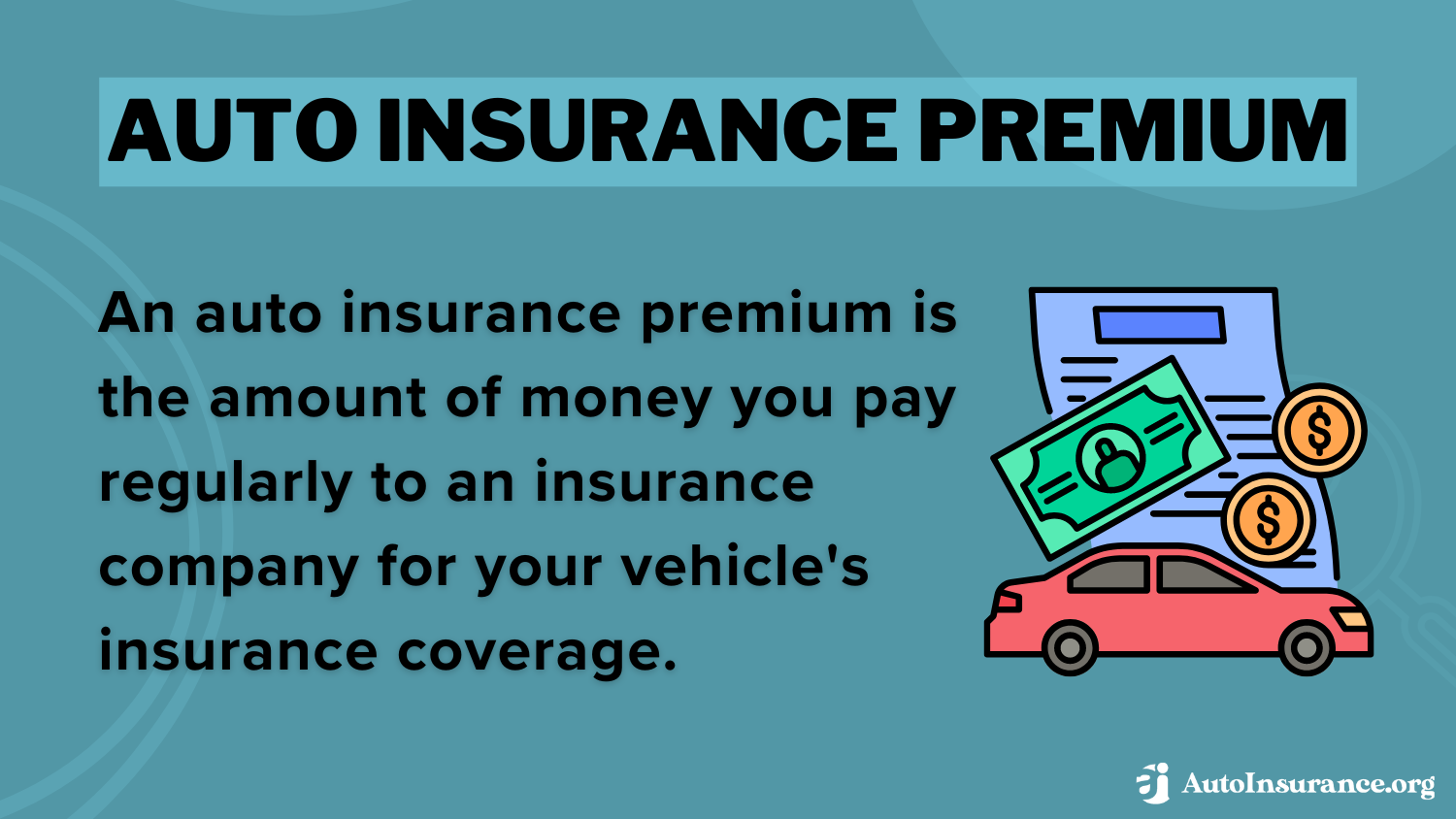
Frequently Asked Questions
What is the auto insurance premium definition?
So, what is the insurance premium definition? The auto insurance premium is the payment you make to maintain your insurance coverage, either monthly or semi-annually.
Is a car insurance premium paid monthly or yearly?
The answer depends on what type of payment plan your insurance company offers and which you choose. You may have monthly or six-month to 12-month payments.
Generally, most insurance companies offer a discount if you pay for six months or a year of coverage in full instead of monthly payments.
What is the difference between a deductible and a premium?
Your deductible is the amount you agree to pay out of pocket in a claim. So if you have a $500 deductible and $2,000 worth of damages, your insurance company will pay you $1,500. On the other hand, your premium is the amount you pay for insurance coverage. Learn how to pay your auto insurance deductible.
What is the difference between a car insurance quote and an insurance premium?
A car insurance quote estimates how much the insurance company will charge you for coverage. However, your insurance premium, which you pay after signing up with the company, may differ from the quote you received.
The quote process collects more simplified information to gauge a base rate. Then, once a driver signs up, the insurer looks more in-depth into a driver’s profile to calculate the exact premium.
Is there an insurance premium grace period?
Yes, insurance companies offer a grace period if you miss an insurance premium payment, so you aren’t immediately without coverage.
This grace period can range anywhere from a week to a month. Once the grace period is over, the insurance company can cancel your policy if you still haven’t made payments.
Can you get back the money paid for insurance premiums?
Yes, you may be eligible for a refund on your auto insurance premium if you cancel your policy before the term expires. The refund amount will depend on the specific terms outlined in your policy and the timing of the cancellation. Insurance companies typically prorate the premium refund based on the unused portion of the policy term.
Find more information on how to manage your auto insurance policy.
What is an auto insurance annual premium?
An auto insurance annual premium is the total amount you pay for your coverage over the course of a year.
What is the auto insurance premium meaning?
Auto insurance premium refers to the cost you pay regularly to keep your vehicle insured.
If you’re just looking for coverage to drive legally, enter your ZIP code below to compare cheap auto insurance quotes near you.
What happens if I cannot afford to pay my insurance premium?
It’s important to maintain continuous auto insurance coverage to comply with legal requirements and protect yourself financially. If you’re struggling to pay your insurance premium, contact your company and explain the situation.
They may be able to offer payment plans or suggest alternative coverage options that better fit your budget. Cancelling your policy due to non-payment of your premium can lead to penalties, driving without auto insurance, and potential difficulties in obtaining coverage in the future.
What are automobile insurance premiums?
Automobile insurance premiums are the payments made to an insurer in exchange for coverage on your vehicle.
How are auto insurance premiums calculated?
What does annual premium mean for car insurance?
What is the average car insurance premium in the US?
What are examples of auto insurance premium?
Why is my car insurance premium so high?
Who pays the highest auto insurance premiums?
At what age is the car insurance premium most expensive?
How to calculate premium in insurance?
Is it better to pay the car insurance premium monthly or every 6 months?
What is the simplest way to lower your auto insurance premium?
Does my credit score affect my car insurance premium?
How can you avoid high car insurance premiums?
Who normally has the cheapest auto insurance premium?
Get a FREE Quote in Minutes
Insurance rates change constantly — we help you stay ahead by making it easy to compare top options and save.



